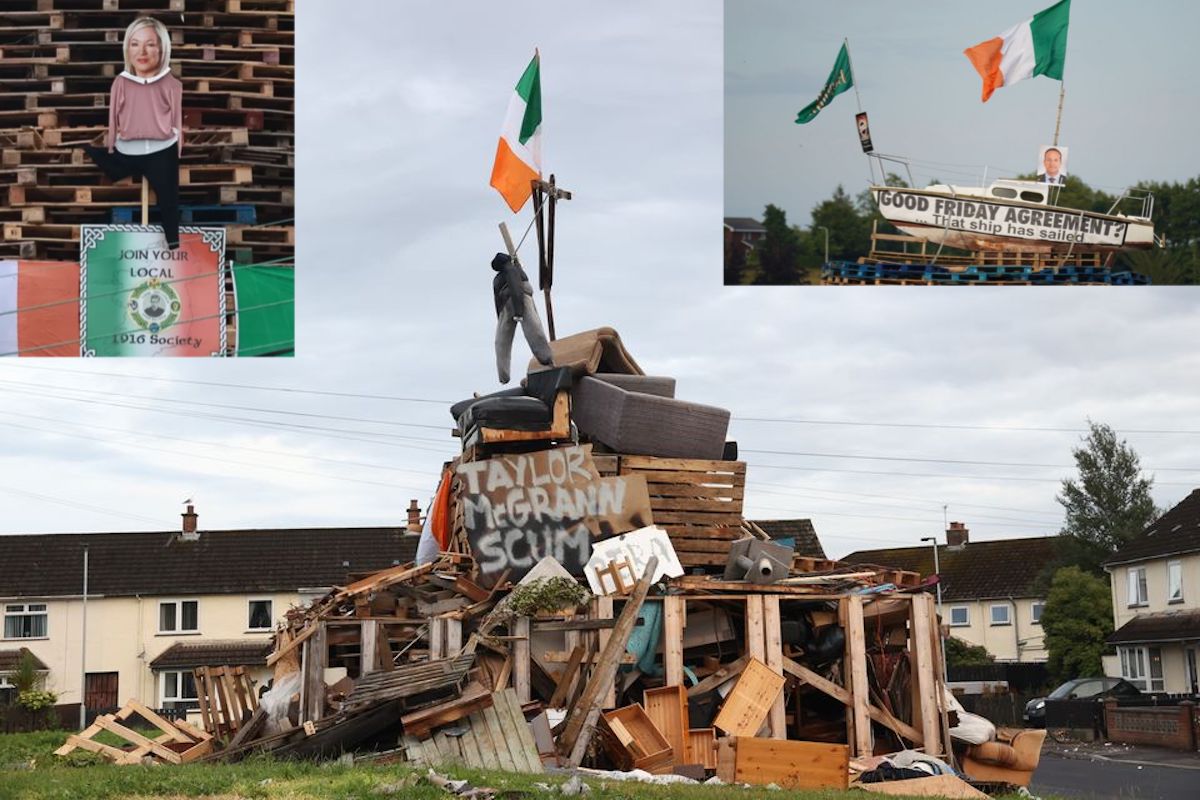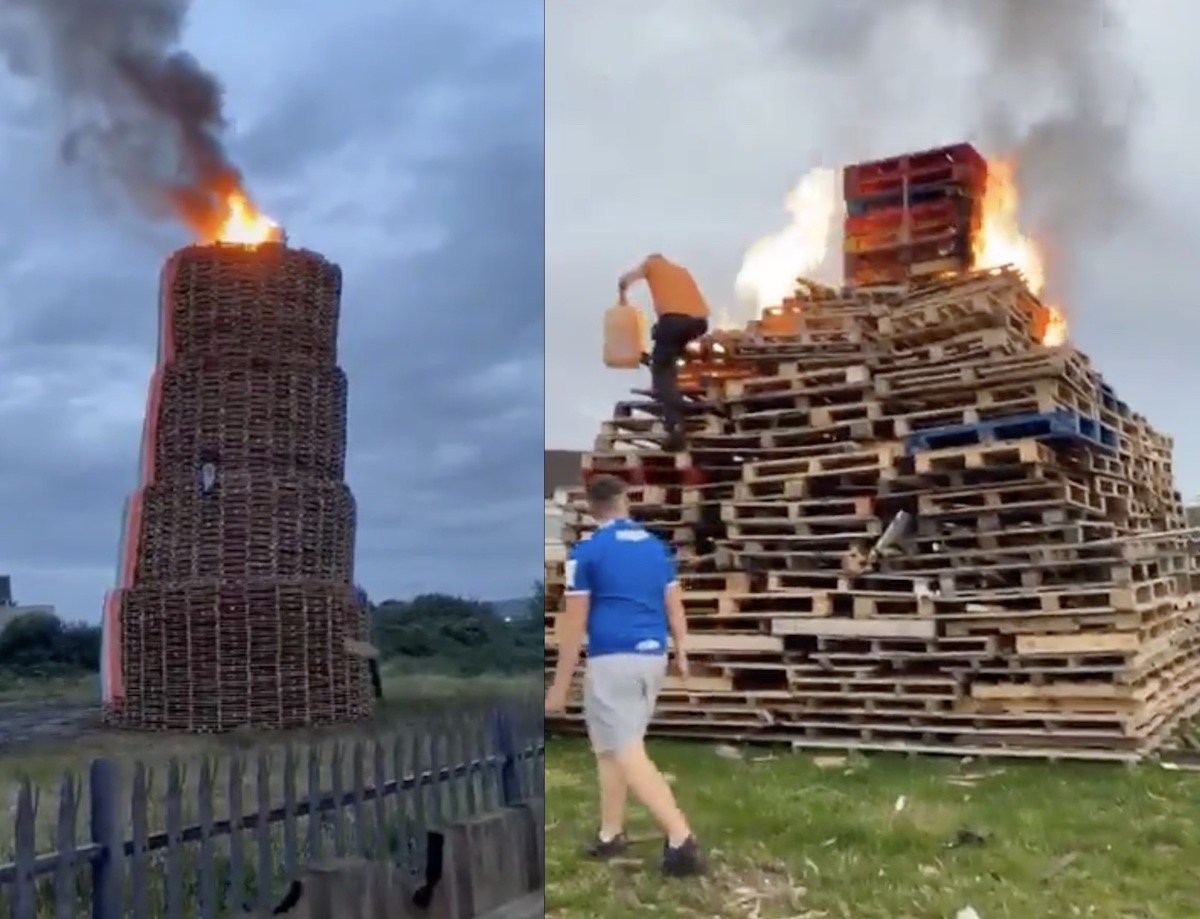
‘Eleventh Night’ bonfires have once again exposed the acquiescence of the Six County statelet in the violent, hate-filled actions of loyalist gangs.
Every year, unionist paramilitaries and their supporters construct scores of bonfires from pallets and waste items under the eyes of the authorities in the Six Counties.
They take place on the eve of the ‘Twelfth’, the victory of a Protestant King William of Orange over Catholic King James II in 1690, itself marked by numbers of militant and territorial marches.
The provocative pyres and the burning of nationalist symbols, flags, and images, sometimes in effigy, have long been a source of criminality and sectarianism.
This year, a desperate effort to place the bonfires in a political context saw one attempt to blame the Dublin government for the outcome of Brexit.
Set alight three days before the Eleventh itself, the bonfire in Moygashel, County Tyrone, culminated with the burning of an Irish national flag, the flag of the Irish Republic, and a poster of Taoiseach Leo Varadkar, all atop a scrapped boat intended to signify the so-called ‘Irish Sea Border’ of Brexit. The PSNI and the emergency services stood by as the hate crime took place.
Loyalist blogger Jamie Bryson delivered a speech at the event in which he denounced what he claimed was the “cultural subjugation” of unionism. But a range of unionist politicians and officials were forced to disown the event, including DUP leader Jeffrey Donaldson, who tweeted: “Burning the flag of our neighboring state and a poster of the head of government of that state is disrespectful and wrong. It is not culture.”
The usual panoply of bonfire hate crimes took place on the ‘Eleventh’ itself, including the burning in effigy of Sinn Fein vice president Michelle O’Neill in Dungannon, County Tyrone. Other efforts included the hanging in effigy of young councillor Taylor McGrann, labeled ‘PIRA scum’ atop a bonfire in Rathcoole, despite the SF man being born well after the end of the Provisional IRA’s armed struggle.
Posters of politicians from mainstream political parties were burned, including those pof the SDLP, the Alliance Party, and People before Profit. Other targets in various locations included the IRSP, Saoradh, the 1981 hunger strikers, the GAA, Palestine, and the Basque Country.
The IRSP in Derry ironically thanked the bonfire builders of Drumahoe “for their annual order of republican socialist flags” after several appeared on a bonfire in the townland to the east of the city.
SDLP Belfast councillor Gary McKeown tweeted a picture of one of his election posters on a bonfire in west Belfast with a message to wish “everyone has a happy, healthy, and inclusive celebration”.
Sinn Féin’s Gerry Kelly spoke out against unionist claims the bonfires are ‘cultural’ events. said: “None of this behavior represents legitimate expressions of culture - these are sectarian hate crimes.”
Unionist condemnations of the sectarian burnings were perfunctory and hollow, and once again failed to call on the PSNI or other government agencies to take action.
Basic safety requirements were again overlooked, even on council-owned land, despite one bonfire builder falling to his death last year.

In the most serious incident this year, a man was badly injured when he plunged from a giant burning pyre in Newtownards. Another narrowly escaped disaster when he came crashing down amid flames clutching a giant drum of petrol.
The DUP showed its support for the chaotic scenes last week when MP Sammy Wilson hailed one bonfire as the ‘best of Northern Ireland’ in a Westminster parliamentary motion.
“The efforts of the people in Craigyhill are an example of what is best in Northern Ireland,” he said.
“This is truly a community venture and one that has involved people from right across the community, and it is a demonstration of how positive engagement in our history and culture can bring people together.”
But the culture of violence, alcohol, and drug abuse at the bonfires has led to criticism by ambulance staff after they were attacked.
The North’s Ambulance Service said eleven of its members were injured in assaults at four different locations and had threats made on their lives.
Crews were responding to calls to provide medical treatment to loyalists requiring assistance. Five staff members were punched, kicked, bitten, and spat at at a bonfire site in the Carrickfergus area, while others were attacked in Lisburn and Belfast.
![[Irish Republican News]](https://republican-news.org/graphics/title_gifs/rn.gif)
![[Irish Republican News]](https://republican-news.org/graphics/title_gifs/harp.gif)

